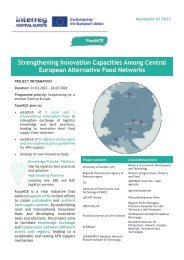The EU, the EEU, and the War in Ukraine: Political Risks and Management Options
This special issue entitled “The EU, the EEU, and the War in Ukraine: Political Risks and Management Options” is published within the framework of the Jean Monnet Network project “The EU and the EEU: Between Conflict and Competition, Convergence and Cooperation” (EUCON). The aim of this project co-funded by the Erasmus+ programme is to explore the complexity of relations between the European Union and the Eurasian Economic Union.
This special issue entitled “The EU, the EEU, and the War in Ukraine: Political Risks and Management Options” is published within the framework of the Jean Monnet Network project “The EU and the EEU: Between Conflict and Competition, Convergence and Cooperation” (EUCON). The aim of this project co-funded by the Erasmus+ programme is to explore the complexity of relations between the European Union and the Eurasian Economic Union.
- No tags were found...
You also want an ePaper? Increase the reach of your titles
YUMPU automatically turns print PDFs into web optimized ePapers that Google loves.
Hannes Meissner / Johannes Leitner<br />
In regard to <strong>the</strong> post-Soviet region as a whole, political risks that have to be managed have<br />
reached a new dimension. However, some rules of <strong>the</strong> game are not entirely new. While Ukra<strong>in</strong>e<br />
has become a battlefield of a proxy war of nutrition, <strong>in</strong>dicators of this dramatic change have been<br />
observable long before February 24 th . <strong>The</strong> August war of 2008, when Russia openly <strong>in</strong>tervened<br />
militarily at <strong>the</strong> side of South Ossetia <strong>and</strong> Abkhazia aga<strong>in</strong>st Georgia, <strong>the</strong> annexation of Crimea<br />
<strong>and</strong> <strong>the</strong> war <strong>in</strong> Eastern Ukra<strong>in</strong>e s<strong>in</strong>ce 2014/15 have been major events affect<strong>in</strong>g bus<strong>in</strong>esses <strong>in</strong><br />
<strong>the</strong> region. <strong>The</strong> latter events resulted <strong>in</strong> <strong>EU</strong> sanctions on Russia <strong>and</strong> Russian countersanctions.<br />
In recent years, <strong>the</strong>se geopolitical risks have added-up to a political risk constellation traditionally<br />
pos<strong>in</strong>g high risks to bus<strong>in</strong>ess operations of European enterprises. <strong>Political</strong> <strong>in</strong>stability, clientelism,<br />
<strong>in</strong>formal practises, legal uncerta<strong>in</strong>ty, a low guarantee of property rights, <strong>and</strong> unresolved<br />
territorial conflicts have been political risks characteristic of <strong>the</strong> region s<strong>in</strong>ce <strong>the</strong> dissolution of<br />
<strong>the</strong> Soviet Union <strong>in</strong> 1991.<br />
<strong>The</strong> <strong>in</strong>stallation of Russia-friendly governments <strong>and</strong> local adm<strong>in</strong>istrations <strong>in</strong> <strong>the</strong> conquered<br />
regions of Ukra<strong>in</strong>e have far reach<strong>in</strong>g effects on <strong>the</strong> local bus<strong>in</strong>ess constellation. <strong>The</strong> current experience<br />
of Western corporate partners <strong>in</strong> <strong>the</strong>se local cases give a first foretaste of what may be<br />
to come elsewhere <strong>in</strong> Ukra<strong>in</strong>e <strong>and</strong> <strong>the</strong> post-Soviet region. Russia is not only tighten<strong>in</strong>g its grip on<br />
Ukra<strong>in</strong>e, but on o<strong>the</strong>r governments <strong>in</strong> <strong>the</strong> region as well. <strong>The</strong> idea of <strong>the</strong> expansion of <strong>the</strong> Union<br />
State between <strong>the</strong> Russian Federation <strong>and</strong> Belarus beyond <strong>the</strong> two countries, as recently put<br />
forward by Lukashenko, potential fur<strong>the</strong>r (military) conflicts <strong>in</strong> pro-Western republics (Moldova,<br />
Georgia, Kyrgyzstan), break<strong>in</strong>g up <strong>in</strong>ner-state conflicts (Uzbekistan, Kazakhstan), <strong>and</strong> responses<br />
by <strong>the</strong> West on <strong>the</strong> new Russian imperialism, will all have a significant impact on enterprises<br />
operat<strong>in</strong>g <strong>in</strong> <strong>the</strong> region.<br />
With Russia’s tighten<strong>in</strong>g grip, Western security <strong>and</strong> management patterns, as well as <strong>the</strong> leverage<br />
of Western embassies <strong>and</strong> trade commissions, will be pushed back <strong>in</strong> <strong>the</strong> <strong>in</strong>dividual countries.<br />
<strong>Political</strong> <strong>in</strong>stability, corruption, deficiencies concern<strong>in</strong>g <strong>the</strong> rule of law will most likely <strong>in</strong>crease.<br />
Under <strong>the</strong> new rulers <strong>in</strong> <strong>the</strong> conquered regions of Ukra<strong>in</strong>e, expropriation measures seem to be<br />
<strong>in</strong>evitable. Such measures can be directed at one’s own company <strong>and</strong>/or important bus<strong>in</strong>ess<br />
partners. At <strong>the</strong> same time, reform pressure by <strong>the</strong> <strong>EU</strong> will decrease <strong>and</strong> trade agreements<br />
with <strong>the</strong> West will become less important <strong>in</strong> countries under Russian control. In <strong>the</strong> Eastern<br />
Partnership region, this particularly concerns <strong>the</strong> Deep <strong>and</strong> Comprehensive Free Trade Agreements<br />
(DCFTA) with <strong>the</strong> <strong>EU</strong>.<br />
<strong>The</strong>se developments need to be analysed, monitored, <strong>and</strong> managed. In any case, companies<br />
firstly have to identify specific risk factors affect<strong>in</strong>g <strong>the</strong>ir company/<strong>the</strong>ir projects. <strong>The</strong>y <strong>the</strong>n<br />
must evaluate <strong>the</strong> possible effects <strong>and</strong> prioritise along <strong>the</strong> dimensions “probability <strong>and</strong> impact”<br />
before f<strong>in</strong>ally develop<strong>in</strong>g <strong>and</strong> implement<strong>in</strong>g mitigation strategies for <strong>the</strong> respective risk constellation.<br />
16 Wirtschaft und <strong>Management</strong> · B<strong>and</strong> 33 · März 2023















